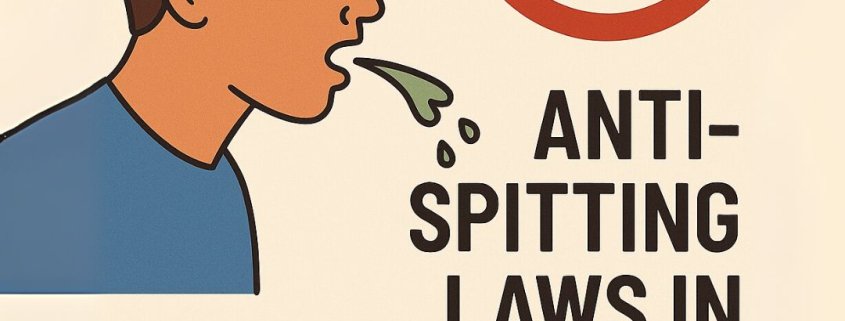Breaking Down India’s Anti-Spitting Laws: A Complete Guide to Public Health Protection
Public spitting has been a long-standing concern in India, affecting both public health and cleanliness. While many people consider it a minor issue, spitting in public places creates serious health risks and environmental problems. The COVID-19 pandemic brought renewed focus to this matter, pushing lawmakers to strengthen anti-spitting laws across the country.
Understanding Why Anti-Spitting Laws Matter
Spitting in public places is common in many parts of India, often linked to habits like chewing betel quid, gutka, or tobacco. For years, this practice was socially accepted in offices, railway stations, parks, and streets. However, spitting creates major health hazards by spreading infectious diseases like tuberculosis, influenza, and COVID-19.
When people spit, their saliva can carry harmful germs that contaminate surfaces and spread airborne diseases. This makes legal action necessary to protect public health and maintain cleanliness. LEGAL ASSIST experts emphasize that understanding these laws helps citizens know their rights and responsibilities.
Central Government Laws Against Spitting
India’s central laws provide the foundation for anti-spitting measures across different sectors:
Factories Act, 1948
This important law requires factories to provide clean spittoons in convenient locations. Factory owners must display notices about spitting rules and penalties. Breaking this law results in a fine up to ₹5. While focused on workplaces, this Act shows the government’s early concern about spitting.
Indian Railways Rules, 2012
Railway premises strictly prohibit spitting except in designated areas. Violators face fines up to ₹500. These rules recognize that railway stations are high-traffic public spaces where disease transmission risks are greater.
Disaster Management Act, 2005
During the COVID-19 pandemic, this Act became crucial for anti-spitting enforcement. It allows central and state governments to ban public spitting as a health emergency measure. Penalties include imprisonment up to one year, fines, or both. If spitting causes death, imprisonment can extend to two years.
State-Level Anti-Spitting Laws
Many states have created their own specific laws with varying penalties and enforcement methods:
Tamil Nadu’s Comprehensive Approach
Tamil Nadu’s 2002 Act clearly defines spitting as ejecting saliva after chewing tobacco or similar substances. The law prohibits spitting in public workplaces and vehicles, requiring display boards about the offense. First-time offenders pay up to ₹100, while repeat offenders face fines from ₹200 to ₹500.
Uttarakhand’s Strict Penalties
Uttarakhand’s 2016 Act imposes harsh punishments with fines up to ₹5,000 or six months imprisonment. Repeat offenders pay an additional ₹500 per day for continued violations. This shows the state’s serious commitment to cleanliness.
West Bengal’s Clear Framework
West Bengal’s 2003 Act applies to public places and vehicles, requiring anti-spitting boards everywhere. First offenses carry fines up to ₹1,000, while subsequent violations range from ₹2,000 to ₹5,000. The Act makes these offenses cognizable and bailable.
Maharashtra’s Enhanced COVID-19 Response
The Bombay Police Act amendments during COVID-19 created escalating penalties. First offenses result in ₹1,000 fines or warnings. Second offenses bring ₹3,000 fines plus three days of community service. Third or subsequent offenses cost ₹5,000 plus five days of community service.
Local Body Regulations and Enforcement
Municipal corporations and local authorities often create by-laws against spitting. These typically prohibit spitting in streets, markets, parks, and public buildings. Local laws usually require spittoons in public areas and “No Spitting” signs at prominent locations. Fines generally range from ₹50 to ₹500.
LEGAL ASSIST professionals note that local enforcement depends on municipal health officers, sanitation workers, and police officials. However, implementation often faces challenges due to limited resources and public awareness.
Challenges in Implementation
Despite comprehensive laws, enforcement remains weak due to several factors. Low penalties in some states don’t effectively deter offenders. Cultural acceptance of spitting makes behavior change difficult. Administrative challenges include insufficient enforcement staff and inadequate public awareness campaigns.
The COVID-19 pandemic highlighted these gaps, forcing authorities to strengthen existing laws and create temporary measures. States like Assam, Meghalaya, Goa, Gujarat, Jharkhand, Punjab, and Rajasthan issued emergency notifications banning spitting under their Epidemic Diseases Acts.
The Way Forward
India’s anti-spitting laws show clear government intention to address this public health issue. However, success requires better enforcement, higher penalties, and increased public awareness. LEGAL ASSIST recommends that citizens understand their local laws and report violations to appropriate authorities.
Education campaigns highlighting health risks of spitting, combined with consistent enforcement, can create lasting behavioral change. As India continues developing its urban areas, maintaining public cleanliness through effective anti-spitting laws becomes increasingly important for creating healthy, livable communities.
The fight against public spitting requires cooperation between lawmakers, enforcement agencies, and citizens. Only through combined efforts can India achieve its goal of clean, healthy public spaces for everyone.





